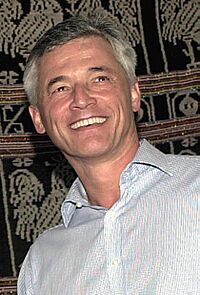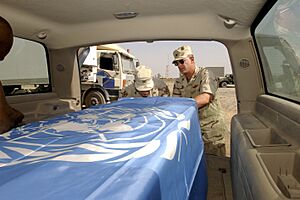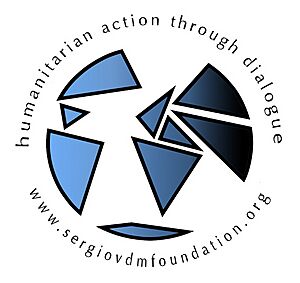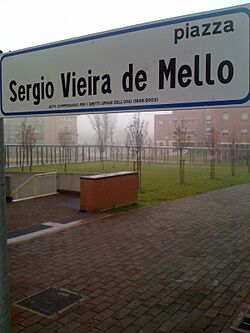Sérgio Vieira de Mello facts for kids
Quick facts for kids
Sérgio Vieira de Mello
|
|
|---|---|

Vieira de Mello c. 2002
|
|
| 3rd United Nations High Commissioner for Human Rights | |
| In office 12 September 2002 – 19 August 2003 |
|
| Preceded by | Mary Robinson |
| Succeeded by | Bertrand Ramcharan (acting) |
| East Timor UN Transitional Administrator | |
| In office 25 October 1999 – 20 May 2002 |
|
| Preceded by | José Abílio Osório Soares (as Governor of East Timor) |
| Succeeded by | Xanana Gusmão (as President of East Timor) |
| Personal details | |
| Born | 15 March 1948 Rio de Janeiro, Brazil |
| Died | 19 August 2003 (aged 55) Baghdad, Iraq |
| Cause of death | Killed in the Canal Hotel bombing |
| Spouse |
Annie Personnaz
(m. 1973–2003) |
| Domestic partner | Carolina Larriera (2001–2003; his death) |
| Children | 2 |
| Alma mater | Federal University of Rio de Janeiro University of Paris (Sorbonne) University of Paris 1 Panthéon-Sorbonne |
| Awards | Order of the Two Niles (1973) |
Sérgio Vieira de Mello (born March 15, 1948 – died August 19, 2003) was a Brazilian United Nations diplomat. He worked for the UN for over 34 years. He helped with many programs that focused on helping people and solving political problems around the world.
The government of Brazil honored him after his death with the Sergio Vieira de Mello Medal. This award recognized his work in promoting peace, keeping countries safe, and improving living conditions for people in war zones. Sérgio Vieira de Mello dedicated his life to these important goals.
He was killed in a bombing in Iraq on August 19, 2003. Twenty other people from his team also died. At the time, he was the UN High Commissioner for Human Rights and the UN Special Representative for Iraq. Before he passed away, many thought he might become the next UN Secretary-General.
Contents
Early Life and Education
Sérgio Vieira de Mello was born in Rio de Janeiro, Brazil, on March 15, 1948. His father was a diplomat, so Sérgio lived in many different countries as a child. These included Buenos Aires, Genoa, Milan, Beirut, and Rome.
In 1965, he started studying philosophy at the Federal University of Rio de Janeiro. He later moved to Europe to continue his studies at the University of Paris. While in Paris, he took part in student protests in 1968. During these protests, he was hit by a police baton, which left a mark above his right eye. After graduating in 1969, he moved to Geneva, Switzerland. There, he got his first job as an editor at the United Nations High Commissioner for Refugees (UNHCR).
He was fluent in Portuguese, English, Spanish, Italian, and French. He also knew some Arabic and Tetum.
Working for the United Nations
Sérgio Vieira de Mello's career at the UN began by helping people in need. He worked in places like Bangladesh during its war for independence in 1971. He also helped refugees return home in Sudan in 1972 and in Cyprus after a conflict in 1974.
These early jobs were about providing direct help. He organized food, shelter, and other aid for refugees. He continued this work in Mozambique, assisting people fleeing conflict in Zimbabwe. He was effectively in charge of the mission there.
Later in his career, he focused on bigger challenges. He spent time in Peru and served as a special envoy for the UNHCR in Cambodia. He was the first and only UN representative to talk with the Khmer Rouge group. From 1981 to 1983, he was a senior political adviser in Lebanon.
In the 1990s, he worked on clearing land mines in Cambodia and Yugoslavia. He also helped with refugee issues in central Africa. In 1996, he became the Assistant High Commissioner for Refugees. Two years later, he became the Under-Secretary-General for Humanitarian Affairs and Emergency Relief Coordinator. He also served as a special UN envoy in Kosovo in 1999.
He played a key role in helping "boat people" in Hong Kong. In 2000, he visited Fiji to help find a solution to a hostage situation involving the country's Prime Minister.
Before becoming the UN High Commissioner for Human Rights in 2002, he was the UN Transitional Administrator in East Timor. From 1999 to 2002, he helped East Timor become an independent country.
In May 2003, Sérgio Vieira de Mello was appointed as the Special Representative of the UN Secretary-General to Iraq. This job was meant to last for four months.
His Death
Sérgio Vieira de Mello was killed in the Canal Hotel bombing in Iraq. He was working as the United Nations Special Representative for Iraq at the time. A terrorist group claimed responsibility for the attack.
Many people around the world mourned his death. He was known for his effective work in promoting peace. He had a state funeral in his hometown of Rio de Janeiro, Brazil. His body was later buried in Geneva, Switzerland. He was survived by his two sons, Adrien and Laurent.
Family Life
In 1973, Sérgio Vieira de Mello married Annie Personnaz. They had two sons, Laurent and Adrien. They lived in France, near Geneva.
Awards and Recognition
Sérgio Vieira de Mello received many awards and honors after his death. These included the Legion d'honneur, which is France's highest honor. He also received the Order of Rio Branco, Brazil's highest honor for a citizen. In 2004, he was given the "Statesman of the Year Award" and the Pax Christi International Peace Award.
In Poland, the Polish Prize of Sérgio Vieira de Mello was created in 2003. It aims to promote human rights, democracy, and tolerance.
Sérgio Vieira de Mello Center
The Sérgio Vieira de Mello Center was founded by his mother, Gilda Vieira de Mello. It works to honor his legacy and promote peace. The center partners with universities and focuses on using technology to help communities. It also supports schools and institutions named after Sérgio. The center gives out the Gilda Vieira de Mello Prize each year in Geneva.
Sergio Vieira de Mello Foundation
The Sergio Vieira de Mello Foundation was started in 2007 by his sons and friends. It is based in Geneva and works to continue his ideals and mission. The foundation hosts annual lectures with important speakers.
On December 11, 2008, the United Nations General Assembly decided to make August 19 World Humanitarian Day. This day honors all humanitarian workers and those who have died helping others. Sérgio Vieira de Mello's family worked to have this day recognized as a tribute to humanitarian personnel.
Sérgio Vieira de Mello also helped create the United Nations Housing Rights Programme. This program helps countries ensure people have proper housing.
After his death, the city of Bologna, Italy, named a square Piazza Sérgio Vieira de Mello in his honor.
His life was also the subject of a 2020 movie called Sergio.
Career Timeline
- 1969–1971: French Editor, UNHCR, Geneva, Switzerland
- 1971–1972: Project Officer, UNHCR, Dhaka, East Pakistan
- 1972–1973: Programme Officer, UNHCR, Juba, Sudan
- 1974–1975: Programme Officer, UNHCR, Nicosia, Cyprus
- 1975–1977: Deputy Representative and Representative, UNHCR, Maputo, Mozambique
- 1978–1980: Representative, UNHCR, Lima, Peru
- 1980–1981: Head of Career Development and Training Unit, UNHCR, Geneva, Switzerland
- 1981–1983: Senior Political Officer, UNIFIL, DPKO, Lebanon
- 1983–1985: Deputy Head of Personnel, UNHCR, Geneva, Switzerland
- 1986–1988: Chef de Cabinet and Secretary to the executive committee, UNHCR, Geneva, Switzerland
- 1988–1990: Director of Asia Bureau, UNHCR, Geneva, Switzerland
- 1990–1991: Director of External Affairs, UNHCR, Geneva, Switzerland
- 1991–1993: Director for Repatriation and Resettlement Operations, UNTAC, DPKO, and Special Envoy of High Commissioner Sadako Ogata, UNHCR, Phnom Penh, Cambodia
- 1993–1994: Director of Political Affairs, UNPROFOR, DPKO, Sarajevo, Bosnia-Herzegovina
- 1994–1996: Director of Operations and Planning, UNHCR, Geneva, Switzerland
- October–December 1996: Special Envoy of Secretary-General to the Great Lakes Region
- 1996–1998: Assistant High Commissioner for Refugees, UNHCR, Geneva, Switzerland
- 1998–2002: Under-Secretary-General for Humanitarian Affairs, UN, New York, US
- June–July 1999: Special Representative of the Secretary-General to Kosovo
- 1999–2002: Transitional Administrator, UNTAET, DPKO, and Special Representative of the Secretary-General of the United Nations, Dili, East Timor
- 2002–2003: High Commissioner for Human Rights, Geneva, Switzerland
- May–August 2003: Special Representative of the UN Secretary-General to Iraq
See also
 In Spanish: Sergio Vieira de Mello para niños
In Spanish: Sergio Vieira de Mello para niños
- List of peace activists
- Luiz Carlos da Costa
- World Humanitarian Day
- Sergio (2009 film)
- Sergio (2020 film)
 | Victor J. Glover |
 | Yvonne Cagle |
 | Jeanette Epps |
 | Bernard A. Harris Jr. |





